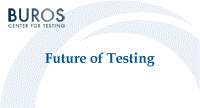Buros-Nebraska Series on Measurement and Testing

The Future of Testing
Date of this Version
1986
Document Type
Article
Citation
Published in The Future of Testing, edited by Barbara S. Plake & Joseph C. Witt (Hillsdale, NJ: Lawrence Erlbaum Associates, 1986).
Abstract
COMPUTER TECHNOLOGY IN TESTING
Although computers have had an important role in educational and psychological testing for decades, the widespread availability of personal computers has focused interest on the appropriate role of computerization in the development, administration, scoring, and interpretation of tests. Although the early decades of computer usage found hardware and services concentrated in large computer installations, future decades will find hardware and services distributed more widely among individual users. With this rapid diffusion of technology and the lightning speed with which technology is changing, it will be increasingly difficult to predict the directions that computerized testing will take. Therefore, the purpose of this review is to discuss some broad themes in the future of computer technology as applied to testing, but, at the same time, restricting the discussion to methodology and usages that appear feasible for application in the near future.
Although it is always tempting in the discussion of any innovation, this review will resist the urge to view computerized testing or computerized interpretation of tests as a panacea for all of the limitations of non-automated procedures. In fact, computerized test interpretation raises several new ethical issues and complications that magnify the latent problems of inexperienced test users (Zachary & Pope, 1983). It remains clear that skillful and imaginative clinical use of tests and assessment will always require the reasoned guidance of the experienced professional. Computers remain a tool to the professional, admittedly a more complex tool than previously available to the individual user.
This chapter has two time perspectives: (1) current status and (2) future directions. Within each of these perspectives, four areas of computerization are discussed: (a) aides to test development , (b) test administration, (c) scoring, and (d) the interpretation of test results.


Comments
Copyright © 1986 by Lawrence Erlbaum Associates. Digital edition copyright © 2012 Buros Center for Testing. This book may be downloaded, saved, and printed by an individual for their own use. No part of this book may be re-published, re-posted, or redistributed without written permission of the holder of copyright.